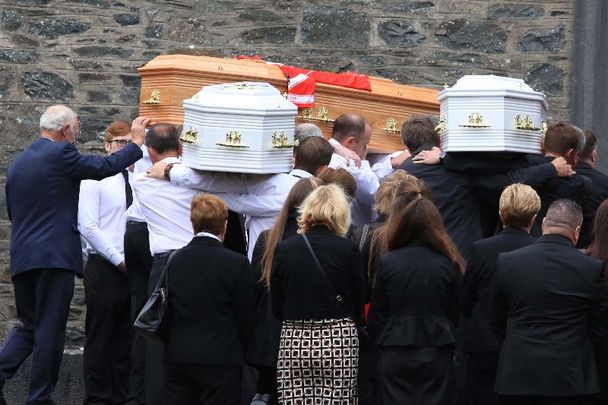It’s the kind of news that sends shivers down the spines of any family, and unfortunately, a recent government report reveals that it's happening all too often.
Shockingly, between 2000 and 2019, Irish authorities recorded 142 instances of family homicide, leading to the tragic loss of 166 lives.
However, these figures only represent the reported cases, leaving room to suspect that the true extent is much higher.
These disturbing cases spare no one, affecting individuals across the entire spectrum of relationships, adults and children, parents and offspring, both married and unmarried partners, current and former, as well as siblings and extended family members.
But the most heartbreaking statistic of all is that in the five years between 2014 and 2019, 11 children were murdered, accounting for over a fifth of all victims in that period with an average age of six years. One-third of these children had not yet reached school-going age.
While women are overwhelmingly the victims, there have been some high-profile cases involving men. In 2021, a farmer in Cork was suspected of murdering his two brothers before taking his own life.
Also in the same year, an inquest in Cork heard that a man who was shot dead by his father and brother in a dispute over inheritance left a note in which he said that he was afraid for the life of himself and his terminally ill mother.
The report titled “Study on Familicide and Domestic and Family Violent Death Reviews” came about because of a campaign by the family of Clodagh Hawe, who was murdered in 2016 along with her three children Liam, aged 13, Niall, 11, and Ryan, six. The crime was committed in Co Cavan by her husband Alan, who then took his own life.
It was a particularly harrowing case, with Clodagh’s mother being the first on the scene to be confronted by a handwritten note pinned on the door by Alan saying not to come in and to call the gardaí.
Clodagh’s family firmly holds the belief that Alan's actions were calculated and not those of someone experiencing a sudden breakdown. Particularly galling for them was his deliberate act of transferring funds from the family joint account to his personal one after committing the crime, an act that meant his relatives would inherit the funds.
Originally buried with his victims, Alan's body was exhumed from its resting place beside Clodagh and her boys and cremated in Dublin. This followed revelations about his dominating behavior and brought to the forefront one of the key themes that go to the root of domestic abuse, namely coercive control.
Coercive control is a broad term that includes various abusive behaviors such as psychological harm, without necessarily involving physical or sexual violence. The law changed in Ireland in 2019, sadly too late for Clodagh and four years after the UK amended its legislation.
From January of that year, a person can be charged with the offense of coercive control if they “knowingly and consistently engage in behavior that is controlling or coercive, which has a significant impact on a relevant person.”
This change has led to a number of successful prosecutions. For instance, in February 2020, a man pleaded guilty at Letterkenny Circuit Court in Donegal to various charges, including harassment, making threats to damage property, and engaging in coercive control.
The court heard evidence of the defendant making thousands of phone calls to his partner over a four-month period in 2019. He also coerced his partner into keeping her mobile phone with her at all times and using FaceTime to provide proof of her whereabouts and companions. Additionally, the defendant was involved in an assault, property damage, and threats of harm.
While these prosecutions are a crucial milestone in holding individuals accountable for their abusive actions, those affected by familicide want further action by the government. Their testament to the report was harrowing, ranging from how they found out about the tragedy to the depersonalized nature of the evidence given in court. There were suggestions for change.
One family member named Declan, as quoted in the report, expressed his difficulty in hearing his loved one referred to as a victim. He emphasized, "She was a mother, a daughter, a sister, an aunt, a friend, and she was loved dearly by all of us."
He also shared his traumatic experience of having to identify the body, likening it to someone holding a gun to his head. Although he was informed that counseling would be provided by someone from the Health Service Executive (HSE), he expressed his immediate need for the services. Unfortunately, he was “left alone, sitting on the grass,” he said.
Another individual, Wendy, conveyed the psychological disturbance she experienced, stating, "There are nights when the victim in the morgue haunts me." Similarly, Pauline explained, "There is anger, there is grief, and there is pain."
While the report addressed many of the procedural and administrative practices around these harrowing events, critics say it did not deal with some of the major issues, including the call by the family of Clodagh Hawe to amend the Succession Act to stop the family of a perpetrator of a murder-suicide inheriting the estate.
On another issue, one grieving mother, Una Butler, expressed her disappointment with the absence of specific recommendations to amend mental health legislation. She finds it "disgusting" that the study did not address this critical issue which bereaved families have been demanding for over a decade.
Butler strongly believes that her two daughters would still be alive today if she had been given more involvement in her late husband's mental health treatment, and has been advocating for changes to the act to ensure families have a central role in their loved one’s care. Tragically, Butler lost two young daughters as well as her husband John in a devastating murder-suicide.
The heartbreaking reality of family homicide cannot be ignored, and the revelations brought forth by this government report paint a grim picture as well as serving as a chilling reminder of the profound impact these tragic events have on individuals and communities.
The stories shared by those affected emphasize the profound emotional and psychological toll that these acts of violence inflict on loved ones left behind. It is a stark reminder that no family is immune to the devastating impact of such tragedies, and it is crucial for society to address these issues head-on and strive for a future where families can live free from the fear of such unthinkable acts.
*This column first appeared in the June 21 edition of the weekly Irish Voice newspaper, sister publication to IrishCentral. Michael O'Dowd is brothers with Niall O'Dowd, founder of the Irish Voice and IrishCentral.




Comments